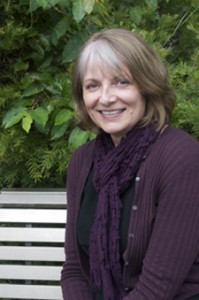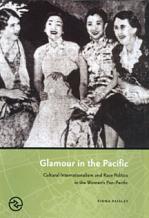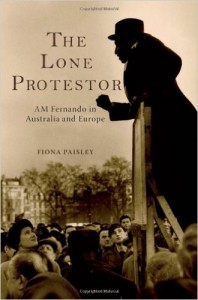Putting the Margin in the Center: Discussing Transnational and Australian History with Professor Fiona Paisley
Fiona Paisley was born in Scotland, but she received her university training in Australia. Based in Brisbane, Australia, she is currently a Professor in the History Program at Griffith University. Our latest guest to the Global History Forum, Fiona Paisley, specializes in international history. Her work is about internationalism, settler colonialism, gender and race in the first half of the twentieth century, from an Australian perspective. Professor Paisley won a Magarey Medal for her biography of Anthony Martin Fernando, an Aboriginal protestor who lived for the second half of his life outside of Australia. The book is called The Lone Protestor: AM Fernando in Australia and London. Professor Paisley and Tiger Li, an Editor-at-Large at the Toynbee Prize Foundation, discuss that book in the second half of our interview.
•
Tiger Li (TL): Professor Paisley, when did you get interested in history?
Fiona Paisley (FP): Looking back gives me the opportunity to think about why I was interested in history from childhood. I spent my first school years in England, and I do remember as a child feeling that history was all around me. Coming to Australia made me realise that "deep time history" is everywhere about us as well, even if the traces are harder to see. The relationship between the distant and more recent pasts of occupation dawned slowly for me as a young adolescent in a settler society like Australia. By the time I was working on my PhD, I started to see more clearly the connections between British colonialism and settler societies and I used my interest in history to try to understand better what it means to be a settler colonial and thus implicated in that ongoing process.
TL: Did you have a transnational perspective from a very young age?
FP: For a long time, global or imperial history positioned Australia at the margins. Transnational history has allowed us to put the margin into the centre. Being new to Australia as a young person gave me an outsider's perspective; I found that studying transnational or world history from Australian perspective is a good way to reframe my approach to global history. Moreover, thinking about perspective and location through your own biography can help reveal connections between places and times otherwise overlooked, veiled, or forgotten. I guess it can be helpful if you move around a lot as you grow up. You feel you are not so much a member of one particular nation or national story but find yourself affiliated with many different places.
TL: I think it is something that I really understand, because I do not feel I belong to anywhere, either. I sometimes feel I am a global citizen. Maybe you can belong to more than one place.
FP: There are many ways to reframe what we mean by history through the transnational approach. On the other hand, simply moving around is not in itself an enlightening experience. In the end, you have to take responsibilities for where you are. And for the historian, that means working in the archives.
TL: You got your M.Ed. from the University of Melbourne, and then you became a high school history teacher, what made you decide to return to university to do a PhD? How did you know you were ready to do a PhD?
FP: Well, opportunities come along, I felt I wanted to do a PhD but I did not know if I was ready or not. I was lucky enough to be doing my tertiary education in the late 1970s, when university educations in Australia were free and there were jobs in academia. So I could leave a well-paid job and take the risk of doing a PhD. I am not sure I had any plans beyond that.
TL: Your PhD was about a group of white middle-class women who were members of state and national organisations, some of whom went to London, where they presented view critical of Aboriginal policy in Australia, including ways to improve Aboriginal women's status and conditions in Australia. How did you come up with this topic?
FP: I started with an interest in eugenics, about women's organisations and their views on the quality of the white race. I found that there were many humanitarian and liberal organisations at federal and state levels, including women's and Aboriginal activist organizations actively critical of Australian policies towards Aboriginal people, including the removal of children, and calling for reserve land for Aboriginal self-development. These networks within Australia campaigned for reserve land to be set aside and for the properly-funded education of Aboriginal children, and for legislation that would protect Aboriginal women from immoral white men. Thanks to their activities, and in response to a series of scandals in Aboriginal affairs that reached international press, middle-class people in Australia knew a quite a lot about Aboriginal conditions in that era. Contrary to our expectations, they read about inquiries into Aboriginal Australia in newspapers, their critical findings of government inquiries, as well as the opinions of liberal critics like the women's networks.
TL: What role did the so-called history wars of the 1990s play in shaping your PhD?
FP: When I was turning my PhD into a book during the 1990s, the "sorry movement" provided a chance for non-Indigenous people to learn more about the history of Australia and to express their sorrow for what happened to Aboriginal people in the past. What I found from my research was that, far from being the first generation to learn about this history, the interwar generation had also known something of what was going on. Among them, progressive women's networks at the state and national level used their connections to call for the reform of Aboriginal policy in Australia at British Commonwealth League conferences held in London among Dominion women. Not surprisingly, criticisms from London were relatively effective. The Anti-Slavery Society was also an influential group garnering international interest in changing federal government policies towards Aboriginal Australians. Rather like the 1990s agendas for remembrance and apology, liberal humanitarian white women hoped that by bringing more information into the public domain, they could change people's views on Aboriginal Australia. In fact, their critiques were absorbed into the status quo.
TL: Did you have a breakthrough moment while working on your PhD?
FP: A breakthrough moment for me was working in Western Australian archives, where I read about Aboriginal women's experiences of settlement, and those of their children. It taught me that secondary trauma can be experienced in the archives. But also that even in the most terrible places like the government settlement at Moore River in that state, some Aboriginal children created happy memories thanks to their own resilience and the strength of their community. Historians have to learn to respect the different narratives of the past, and try to understand and interpret them even where vast divergences occur. So the work is emotional and requires commitment, but history is also always partial and often contradictory.
TL: It is what makes history interesting.
FP: It is, isn't it?
TL: In your book from your PhD, why did you choose to study the interwar period? Do you see London as the political/cultural capital of Australia in the interwar period?
FP: At that time, London was very powerful place from which to critique the Australian government and settler colonialism in Australia. The Australian government did not like being criticized by Australian citizens from overseas.
TL: I think London would also be a powerful place to criticize New Zealand government policies towards Maori at that time. Moving back to your research, in 2009, you published another important book, Glamour in the Pacific: Cultural Internationalism and Race Politics in the Women's Pan-Pacific. I really enjoyed reading this book, and your approach is really about "thinking beyond the nation." Could you tell us a little bit about that?
FP: In 2000s, transnational history and critical imperial history were having big impacts on the writing of Australian and world history. Studying international conferences proved to be a good way to investigate how groups of people with liberal and cosmopolitan interests and expertises from different national and imperial backgrounds came together to discuss the key issues of their day. Thinking beyond the nation allows us to see these conferences as sites of the exchange of ideas but also as cultural events where values and opinions including those about "race" were rehearsed. It is also worth reminding ourselves that the women and men involved were aiming also to think and work beyond the nation. They were participating in the emergence of global society, and they focused on economics, population, education, inter-racial problems and how cultural difference might be respected, even if they also mobilised the hierarchies of advancement typical of their day.
TL: From the 1920s to the 1950s, some Chinese and Japanese were invited to Hawaii, for the Pan-Pacific Women's Conference. Could you tell us more about these conferences?
FP: History is so interesting, because you learn new things all the time. I found out that Japan and China delegates were key agents in internationalism in the Pacific in this era. They and others saw the Pan-Pacific as an important region for the development of global cooperation, partly because of the growing tension between China and Japan over Manchuria (the northeast part of China today), but also because they were intent upon establishing a productive dialogue between East and West.
TL: So this is even before the United Nations were formed. What roles did the Chinese and Japanese women play during the conferences? Did they speak English?
FP: Yes, they did. A number of delegates were educated in both their own country and United States. Some were living in Hawai'i and were quite Americanized in their mode of internationalism. Chinese and Japanese figures from the Leagues of the Nations participated in the conferences of another key network in this period, the Institute of Pacific Relations, an organisation that I am currently investigating in relation to Australian liberalism.
TL: My favourite book of yours is The Lone Protestor. Do you think the Aboriginal man, Anthony Martin Fernando (the subject of your book) felt lonely sometimes during his overseas protest in the second half of his life?
FP: Lone in the title refers to his solitary status. Fernando was a minority figure. We do not know too much about him at all so when he appears in the archives it is really remarkable. Archival sources range from court reports to the small diaries he kept while working in London (shared by the descendants of his former employer) for example. In 1904, already in his middle age Fernando was living in Perth, Western Australia but soon afterwards left Australia for good, from then on living and working – and protesting – in Europe. We have an uneven picture from moments of his life story, based on the meagre sources available to us today, but they lack his explicit reflection on the emotional cost of self-imposed exile from Australia.
As I was writing the book, I struggled with my overarching narrative – would I emphasise his aloneness, his courage, his sorrow or his resilience? When he was living in London in the 1920s, routinely Fernando would stand outside Australia House, the home of the Australian High Commissioner, wearing a long coat with toy skeletons – the same ones he sold as a street trader – in order to protest the frontier violence faced by many Aboriginal people in Australia even in the interwar years. In the 1960s, a journalist writing about these protests imagined Fernando as a sad figure. But you can also surmise that he was happy to be protesting. In this way, he asserted his Aboriginal identity and aimed to improve the conditions of his people. Newspaper accounts tell us about Fernando giving testimony in the Old Bailey. Standing in the dock, he spoke proudly and took over the whole court room with his presence. He was a strong and remarkable figure.
TL: History is very complicated indeed. What made him keep fighting? What was his motivation?
FP: We do not know, other than what he said for mostly public consumption – and I have done my best to provide as much as possible from his own words in the book. Fernando confounds the usual account of Aboriginal people, who mostly traveled overseas before World War One in the company of a white person. His story has been for the most part forgotten. He was an Aboriginal man who travelled independently, who went to Greece, and Europe and travelled and worked his way by ship and on trains, and lived in London. In a way, his story is difficult to fit into the mainstream historiography about Aboriginal vulnerability to oppression by white people.
TL: Did Fernando try to reach out the broad Aboriginal communities to work together for his goals—improving the living conditions of Australian Aborigines?
FP: No evidence suggests that he did. While he was overseas in Europe and in London, he did not speak about the Aboriginal organisations increasingly active in Australia at this time (particularly from the 1920s), and sometimes reported in the British press. The story he tells is one of frontier violence in northern and central parts of Australia, not of the urban world of Aboriginal activist organisations in southern parts of Australia. Fernando is an example of someone whose Aboriginality travelled with him into the world.
TL: Did Fernando know a little bit of what was going on in New Zealand, the way of Maori people was being treated?
FP: He did refer to the reserve system as it was applied to Native Americans in the United States. But he does not talk about New Zealand Aotearoa.
TL: Could you tell us more about your current research agenda?
FP: I am working on two projects that connect up with my previous work. One is on Pacific internationalism, looking at the work at home undertaken by delegates when they came back from conferences. This project spans the 1920s to the1950s. I ask how they represented internationalism to Australian audiences. The other project is about how anti-slavery was applied to the reform of settler colonialism during the first half of the twentieth century.
•
In the interview, Professor Fiona Paisley has us shown her passion for international histories. By putting the margins into the centre, she successfully makes us rethink the role of women and Aboriginal people in the past, as well as in relation to Australia's position in the world. In doing so, she not only challenges our assumptions about Australian history, but also enhances our understandings of the roles that women and Aboriginal people played in internationalising that history.
We thank Fiona for participating in this instalment of the Global History Forum, and look forward to the results of her ongoing research – the most recent of which has appeared in her article in The Journal of Pacific History, "Applied Anthropology and Interwar Internationalism: Felix and Marie Keesing and the (White) Future of the 'Native' Pan-Pacific."


